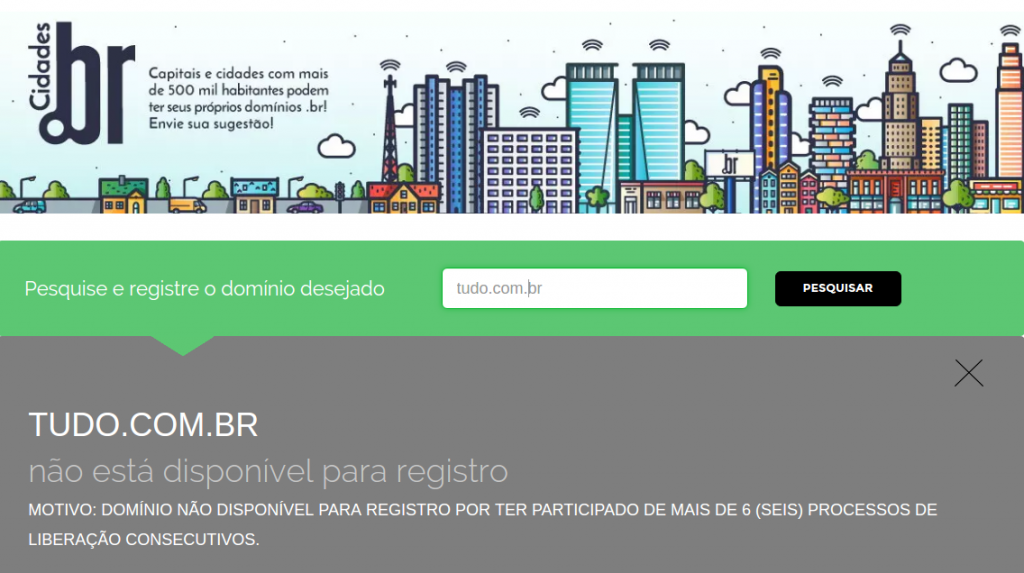Blog
Unsealing the slumbering: the new .br domain name liberation process

13/11/2017
Daniel Oppermann
After years of accumulating highly disputed domain names Brazil’s ccTLD registry NIC.br has developed new policies for the so called liberation process (“processo de liberação”) of expired domain names under the .br extension. Since September 2017 Internet users holding a Brazilian tax number (independently of their nationality) are able to participate in online auctions as a new step of releasing domain names many of which were blocked in the past due to former restrictive policies. Until the ratification of the new additional regulations Internet users had the possibility to participate in domain name liberation processes three times a year just to find out that the most interesting and therefore highly disputed domain names were hold back by the registry after six liberation processes in which at least two users were disputing for the same domain name. In short: interesting and sought-after domain names were blocked by the registry. Users able to provide evidence proving claim to an individual domain name were given priority during this process. In the case of generic second level domain names however, proving claim remained complicated to say the least which is why thousands of domain names were blocked throughout many years.
The 2017 policy reforms facilitate user access to expired domain names of the past and to those expiring in the future. However, not a first come first serve mechanism was introduced but a monthly system of online auctions as a kind of last resort for domain names sought-after by more than one user. Just as ICANN has created a temporary additional income source through new gTLD auctions also NIC.br will make a respectable profit from domain auctions over the coming months if not years depending on a number of variables like the pace of releasing names into auction and the level of public awareness.
A sample of domain names auctioned in October 2017 gives an impression of what users are willing to invest in expired (mostly generic) .br domain names at this moment. While some (e.g. recently expired) domain names are accessible without any or little competition others coming directly from the block list are driving up registration fees for the first year to several thousand reais. A standard annual registration fee for a .com.br domain at the registry is 40 reais, the average monthly salary in the country is about 2500 reais. In comparison to that generic and also more specific domain names could easily cost one, two or several average salaries in an auction. “Vegetarian” (vegetariano dot com.br) reached a highest bid of 2800 reais, “clinic” (clinica dot com.br) went up until 4200 reais, “cat” (gato dot com.br) until 5200 reais and the domain name for the Brazilian Internet law (marcocivil dot com.br) reached a final bid of 5000 reais. Less valuable was the domain name for the 2018 presidential candidate and right-winged populist/extremist Bolsonaro (bolsonaro2018 dot com.br) that did not make it over the mark of 2000 reais. Others were willing to invest much larger amounts like 10 thousand reais for udemy dot com.br (under .com known as an online course platform), “book” (livro dot com.br) which was auctioned for 60 thousand reais or “market” (mercado dot com.br) for 500 thousand reais.
For a substantial calculation of the financial relevance of the new liberation process an analysis of all domain names to be unblocked by the new regulations over the coming months would be necessary. Given the fact that all domain names to be released were disputed among users in the past one can anticipate that the registry will receive a considerable amount of a few million if not a hundred million reais in 2017/2018. Resources that the organization is known to invest into the Internet community by supporting events, publications, courses and more.
At the same time however, the registry is once again concentrating massive resources in the hands of a single hierarchical organization and therefore a relatively small number of people concentrated in the most wealthy and economically dominant part of the country. Instead of fostering a true pluralistic environment by not trying to dominate several fields of activities in the country the organization is too often playing the national monopoly card. While in many other countries private companies and organizations are increasing economic diversity, local decentralized capacity building and specialized workfore by launching independent private DNS projects of several kinds, among them geographical/city TLD registries, NIC.br has decided to also take over this area by recently launching a few dozen city domain name extensions under .br. About 10 thousand city extensions are currently waiting in the pipeline. 46 cities (capitals and those having at least 500 thousand inhabitants) are taking part in the current stage of this project. What could be seen as a supportive act for the digital infrastructure of a country in which investment capital and knowledge regarding the DNS and its respective industry continue to be scarce will most likely turn out to become the fortification of a centralized structure in which all independent companies working in the DNS environment will depend on one single semi-governmental organization.